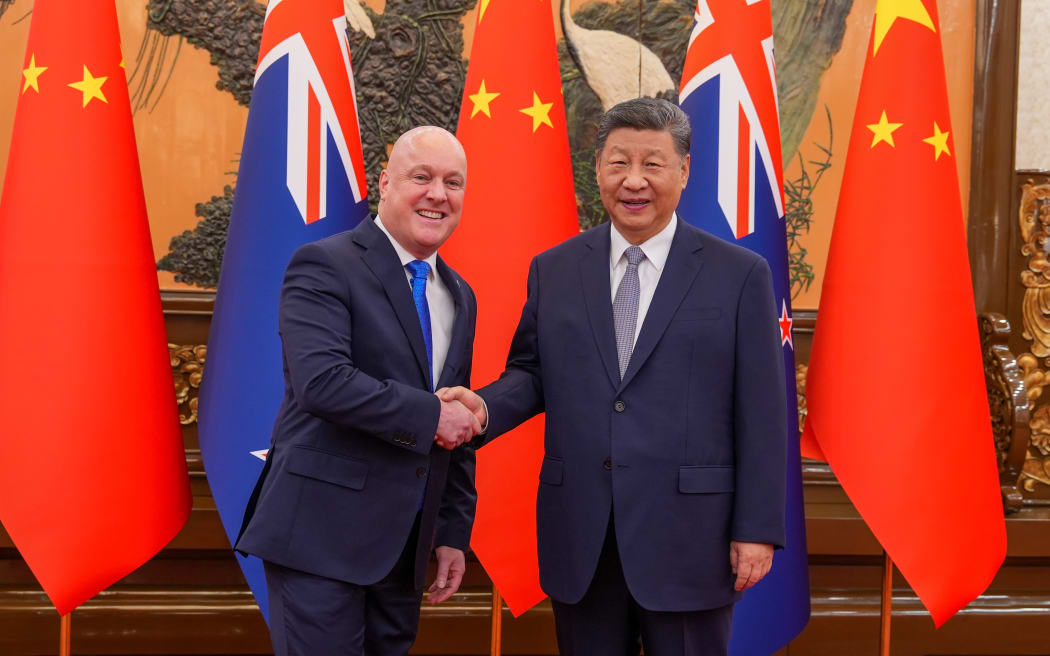
Prime Minister Christopher Luxon greets Chinese President Xi Jinping in Beijing in June. Photo: Office of the Prime Minister
The co-author of a new report that reveals Chinese investment in New Zealand is slowing has called for greater consistency in the country's investment policies irrespective of which parties were in government.
The report, titled Invested Interests - An Update on the New Zealand-China Investment Relationship 2025, examined the two countries' investment relationship.
Prepared by the New Zealand China Council and the New Zealand Institute of Economic Research, the report followed earlier analysis published in 2015 and 2018.
This year's report, released Friday, included updated data on bilateral investment flows, investment policy settings, case studies of Chinese investment in New Zealand, insights on investor migration and New Zealand investment in China.
It showed that foreign investment from China to New Zealand between 2014 and 2024 grew at a faster rate than the latter's overall foreign investment, but investment from China had been slowing in recent years.
Cumulative foreign investment into New Zealand increased by 65 percent over the period, while investment from China more than doubled from $695 million to $1.43 billion - growth of 106 precent, the report said.
"But most of this increase occurred in 2014-19," the report said. "Since 2019, there has been a small decrease in cumulative Chinese investment in New Zealand."
To be exact, Chinese foreign direct investment climbed to $1.49 billion in 2019, a 114 percent increase, while the growth rate was 17.7 percent in 2020-22.
"From 2022 to 2024, China's investment in New Zealand reduced by 18 percent - effectively meaning that Chinese FDI (foreign direct investment) is now lower than in 2019," the report said.

Chris Nixon, principal economist at New Zealand Institute of Economic Research Photo: Supplied
Chris Nixon, principal economist at New Zealand Institute of Economic Research, said reasons for the decline were multifaceted.
"There's no definitive reason because it's a whole confluence of factors starting with Covid," Nixon said.
The global economic situation, the slowdown of the Chinese economy, as well as the changes in investment regulations in New Zealand also played a part, he said.
"There's also another issue here," Nixon said. "Investment is a long-term business, and you've got to think that China is basically being essentially a new trading partner over the last 20 years.
"We had quite an increase, well up to 2019. Some slowdown probably was to be expected, but there is also uncertainty being created and we need to make sure that certainty returns."
China ranked 12th as a source of New Zealand's cumulative foreign direct investment, providing less than 1 percent of total foreign direct investment, the report said.
However, it noted that foreign direct investment from Hong Kong and other sources would include capital from mainland China.

Containers at Ports of Auckland Photo: RNZ / Kymberlee Fernandes
Auckland received most large investment from China, followed by Hawkes Bay, Canterbury and Waikato, according to the report.
It also found that not all New Zealand sectors would be suitable for Chinese investment and there needed to be focus on areas "where China has world-class strengths", including renewable energy, advanced transportation, clean technology and food production.
The United States had overtaken China as the largest source of investor migration applications under the new Active Investor Plus Visa policy, the report said.
The establishment of Invest New Zealand, and proposed changes to the implementation of the Overseas Investment Act, also presented positive opportunities, it said.
At least 60 New Zealand companies have a corporate presence in China, but larger New Zealand investments were scarce, the report said.
Nixon said one of the most important things that stood out to him in the report was the "deepness of trade and the shallowness of [New Zealand's] investment profile in China", which has been New Zealand's largest trading partner.
He said New Zealand shouldn't take ties with China lightly, calling for successive governments to adopt a policy that was consistent.
"I think the point is that we tend to chop and change a lot when new governments come in," Nixon said.
"What I'm looking for is a more consistent approach from a New Zealand Inc. perspective towards China.
"We also ... want to make sure that what we do in China is consistent with what we do in the rest of the world, so there's a level playing field."

John McKinnon, chair at the New Zealand China Council Photo: Supplied
John McKinnon, chair at the New Zealand China Council, said China had played a useful and targeted role over the years in specific sectors of the New Zealand economy, such as waste management and health care as well as renewable energy, clean technology and food production.
He agreed that China was very prominent as a trade partner, but two-way investment flows were far less developed.
"Our new report on two-way investment notes that the areas with most potential for more Chinese investment into New Zealand are those where foreign capital policies of the two countries (China outward and New Zealand inward) align," he said. "This is also relevant to investor migration."
The newly announced Business Investor Visa would undoubtedly attract a lot of interest in China, as in other countries, McKinnon said.





